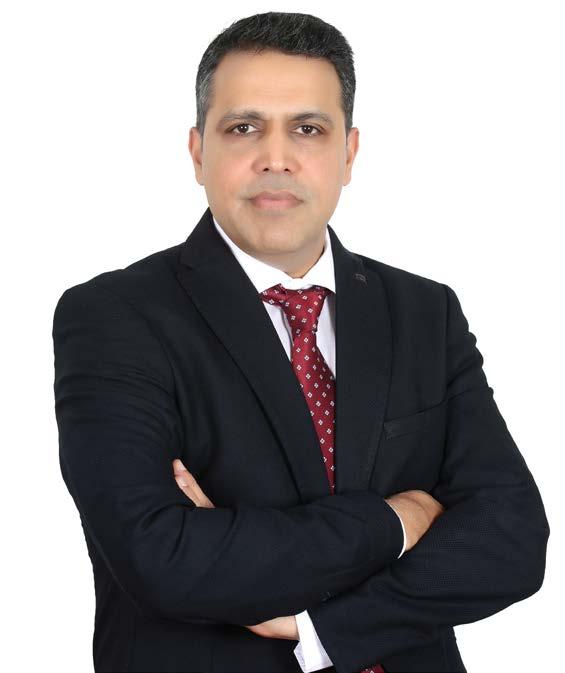
16 minute read
Tata Communications
CNME Editor Mark Forker managed to secure an exclusive interview with Vaneet Mehta, Associate Vice President and Region Head, Middle East, Central Asia & Africa, at Tata Communications, to find out how the global telco provider has responded to an increase in demand for network capacity and bandwidth, what the future of the workplace will look like - and what can be done to make enterprise IT infrastructure more resilient.
Can you outline to our readers how Tata Communications leveraged its technological expertise to help its customers maintain ‘business continuity’ during the COVID-19 pandemic?
With COVID-19, remote working has become the new norm for employees across the globe.
As customers implemented their own work from home measures and looked to shift workloads seamlessly across borders as part of their own business continuity plans, a much higher amount of IT and network resources started being consumed, due to employees video-conferencing customers and colleagues, and accessing large data files stored on the cloud.
The IT infrastructures across most organisations globally were not designed for this level of usage. Enterprise platforms and collaboration applications were overburdened.
They made urgent upgrade requests to service providers, cloud/content service providers and OTTs to cope with the usage spikes. Some content providers and ISPs even tried to intentionally adjust HQ multimedia content to a lower quality to meet the demand.
Tata Communications witnessed an increased demand for network capacity, together with requirements for bespoke solutions that enabled efficient and secure remote working.
Right from the start of the lockdown, Tata Communications was able to augment its network capacity and provide integrated, scalable remote working solutions with in-built secure access to a company’s corporate applications wherever they are hosted, to customers across the world.
By March 2020, we delivered over 650 customers orders, and 1.35 TBPS of additionally provisioned bandwidth – signifying a higher demand for data bandwidth. We also saw a 30% growth in internet traffic on our network in March compared to January 2020.
Tata Communications has been supporting tens of thousands of users across more than 150 organisations, to work from home, collaborate seamlessly, improve employee productivity, and maintain business continuity during this time - truly enabling borderless collaboration.
The COVID-19 pandemic has impacted how we work, when we work, and where we work. However, in your expert opinion what does the future of the workplace look like?
The global pandemic has
Vaneet Mehta
Associate Vice President and Region Head, Middle East, Central Asia & Africa, Tata Communications.
introduced radical changes on both professional and personal fronts and has forced tens of millions of people to adopt remote working almost overnight. As the world bounces back, it is unlikely to go back to the way it functioned pre-COVID.
In the post-COVID era, digital transformation will not be an option, but a mode of survival for most organisations globally. As enterprises are resuming operations, investments in digital platforms will no longer be defined by IT teams but demanded by business teams that need to drive employee, customer, and partner experiences.
Enterprise leaders will actively migrate to new work models that require less face to face interactions. Through this new approach, they will also look to deliver exceptional and innovative customer experiences, enhance operational productivity and efficiency, manage risks, build agility, and drive business growth.
In this new normal, more than 50-60% of employees across various enterprise segments are likely to continue to work from home. And hence, enterprises need a more robust, secure, and scalable work-from-home solution to be able to support this shift.
To help enterprises adapt to this new normal, and future-proof themselves, Tata Communications launched its Secure Connected Digital Experience (SCDx) proposition to enable enterprises to harness the power of digital technologies and drive seamless experience for employees, customers, and partners.
There has been a huge acceleration in digital transformation. How has COVID-19 impacted your business. Are you seeing a growing demand for a ‘contactless customer service’ model?
While COVID-19 has disrupted businesses, customers reliance on our services have only increased. During times of crises, customers seek guidance and support from their trusted brands more than ever.
At Tata Communications our SCDx proposition meets this growing, worldwide demand for new ways of operating, which includes, far higher levels of working from home, rising security risks, a shift to video commerce and more contactless experiences for employees, customers and supply chain partners.
Our Digital Customer Experience Platform is helping recreate the in-store experience online for B2C companies, with the next generation of enterprise commerce and video collaboration solutions for superior digital customer engagement.
It integrates different technologies such as cloud, artificial intelligence (AI), video streaming and hosting to create a secure and stable experience. The platform combines the intelligence of software, application, and telecom connectivity to provide a near-real experience
to customers right from browsing to the end purchase.
What can be done to make enterprise IT infrastructure more resilient, and what would be your recommendation for enterprise security in the present context?
Digitisation has become crucial for businesses in 2020 and beyond. Understanding, adopting, and fast-tracking digital transformation is extremely crucial for enterprises today.
This transformation could be around cloud adoption, work-from-home solution implementations, managing cyber threats, and/or optimising cost of operations, as all of these ensure business continuity and help enterprises remain relevant, agile and profitable in this dynamically changing market scenario.
As work from home becomes the global norm, cybersecurity has become critically important. To support corporate agility,

Tata Communications is working with their customers to deploy simple but effective security strategies that can be implemented seamlessly and quickly within days.
Our zero-trust network access (ZTNA) partnership with NetFoundry (a subsidiary of Tata Communications) ensures that employees enjoy secure access to applications and data in the cloud, regardless of location, device or broadband connectivity, with 3-10X performance acceleration.
On sensitive and critical business applications that cannot be hosted on Cloud, but are homed in enterprise Data

Centres, Tata Communications’ Global Secure Internet Gateway Service (GSIGS), Managed Authentication (mAuth), Secure Web Gateway (SWG) and Privilege Access Management solutions enable end user with access, control and policy compliance, along with seamless user experience to manage and deliver work as usual.
Finally, Tata Communications is a global leader in communications, but what differentiates the company from its rivals and how has it managed to sustain its phenomenal success over such a long period of time?
What sets Tata Communications apart is its ability to continuously transform itself and innovate to stay ahead of customer and market requirements.
Whether it was the decision to move from a Indian voice monopoly to a global communications service provider or making the right business decisions to invest and grow - owning and operating the largest wholly owned and advanced subsea fibre network, carrying around 30% of the world’s internet routes or innovating to offer customised solutions for a post-COVID world even before most organisations had thought about their move to tackle the disruptions brought on by the pandemic.
From its inception to now, Tata Communications has evolved significantly and has supported its customers through their digital requirements for almost two decades.
Today, Tata Communications is a global digital ecosystem enabler, bringing together for its customers, the entire technology ecosystem that plays a role in digital transformation.
We work alongside our customers to re-imagine their business strategy and technology landscape to adapt to the emerging challenges and scenarios by adopting a digital first model to provide a seamless experience for their employees, customers, and partners.
Our lineage of the old telco world, coupled with our knowledge of the new digital world, sets us apart from other players in this digital ecosystem.
We understand the nuances of connectivity and networking, combined with our expertise in cloud, UCC, mobility, IoT and security, and extensive partnerships means that we are a long-term partner in our customers’ digital transformation journey as an enabler of this ecosystem.
We’ve had an incredible journey for the past two decades and I am very excited to continue to be part of the next phase of our growth – both in the region and globally.
VERITAS & FUTURE TEC RANSOMWARE RESILIENCY IN THE “NEW NORMAL”

Data management and protection leader Veritas and leading Information Technology solutions provider Future TEC collaborated in partnership with CPI Media Group this month to host a virtual webinar which aimed to unpack recent developments in ransomware, shed light on the dangers of “dark data”, and outline how organisations can best prepare for inevitable attacks.
The virtual session and panel discussion drew key decision makers from across the IT ecosystem keen to discuss the latest in cyber security threats, most notably the exponential rise in ransomware by cybercriminals intent on holding valuable data hostage for profit.
Raed Abedalkarim, Technology Expert, FutureTEC joined from the company’s Amman offices to open the session with a detailed overview of the company’s partner ecosystem and projects that have underpinned their success since its founding in 2005.
Future TEC’s own cloud, called JOUD, is the foundation of the company’s offerings with data centres located in Kuwait, Bahrain, and the UAE. JOUD Cloud Services from Future TEC include information security, disaster recovery, and JOUD Drive, a proprietary enterprise file sharing platform.
Amr Hussein, Regional Channel Sales Manager, Veritas Technologies then took the screen to deliver the session’s feature presentation, Ransomware Resiliency with Veritas: Protect, Detect, Recover.
Hussein opened the presentation with a statement that resonates with IT professionals worldwide. “Some of the facts of life you cannot control, some of the facts of life you have to react to,” he said. “Ransomware has become a security problem in software operating systems as well as network structures and architectures and it is a problem that is here to stay,” he explained.
Ransomware attacks are on the rise for a number of reasons, Hussain outlined. Traditionally, data has lived in one specific location and access was easily limited. As organisations move more data and services to the cloud, threat surfaces are expanding. Falling per-terabyte storage costs are driving many organisations to store collected data for future analysis or delay the clearing of old or unnecessary data from the cloud. This results in pools of unstructured, unknown, or “dark” data.
“On average you only know about 40 percent of the data that you have,” explained Hussein. Research and analysis group Gartner estimates that more than 80 percent of enterprise data is unstructured, and likely to contain personally identifiable information, he noted.
Dark and unstructured data present clear vulnerabilities to enterprises, and a failure to address these issues can be costly. “Ransomware caused over USD$11.5B in damages to businesses in 2019,” Hussein said, quoting statistics from the latest Symantec Information Security Report, “and it is expected to cost the global economy USD$ Trillion by 2021.”
Adding to this increasingly complex threat landscape, cyber criminals are escalating their methods with phishing emails, texts and advertisements designed to play on the fears of an uncertain workforce unaccustomed to accessing data remotely.
To protect organisations as they adapt to the “new normal”, Veritas offers its Enterprise Data Services Platform, a comprehensive set of technologies supporting IT system protection, ransomware detection and recovery in the face of ransomware.
In the event of a ransomware attack, data recovery needs to be rapid to avoid costly downtime. To that end, Veritas’ Backup Exec grounds its backup and recovery framework on the “3-2-1” rule, an approach to safeguarding data in almost any failure scenario. To be fully prepared for strategic recovery, organisations should have three (3) copies of data on two (2) different types of media plus at least one (1) off-site copy.
“One of the major differences between Veritas and other solutions is the holistic approach that we take,” said Hussein. “We are not only protecting the client, we are protecting the credentials that we use to do the backup and the recovery, the storage of the backup, the replication of the backup, the communication between the backup clients, the backup server, and the back up media or the actual production data as well as the the capability to recover.”
To illustrate the importance of multiple backups with robust security, Hussein recounted a client scenario that had happened that very week. A Veritas client, using Backup Exec, suffered a ransomware attack underpinned by the Phobos virus. “In the morning, they saw that all of their local network shared folders were encrypted and the network was completely down,” recalled Hussein. “The only thing that remained protected was the storage of the write-protected Backup Exec.” The client was able to restore the entire network from a backup Veritas had created, avoiding downtime and data loss.
“However, we would like it if you didn’t have to recover at all,” the executive went on to cite the importance of prevention. “We would rather you detect and respond.”
To that end, Veritas offers a full suite of products designed for data analytics and visualisation. APTARE IT Analytics from Veritas is the only IT analytics platform to offer unified insights for all major storage, backup and virtual infrastructures through a portal for both on-premises and multicloud environments. Veritas’ Data Insight is designed to reveal any anomalies across backups and offers custom reporting that can help reveal key trends.
For organisations that increasingly house data across multiple locations, it’s crucial to have a unified solution that protects all their data across physical, virtual and cloud environments. Vertias’ end-to-end security identifies data, protects it throughout the lifecycle, and restores ransomed data when attacks do occur.
CONDO PROTEGO

COMPLEXITY IN THE CLOUD: STREAMLINING THE MIGRATION ROADMAP International data management company Veritas and leading consultative solutions provider Condo Protego in partnership with CPI Media Group hosted a virtual discussion this month to unpack the challenges of managing a hybrid multi-cloud environment, and outline the solutions for analysing and protecting data, supporting resiliency, and reducing complexity.
The virtual webinar and panel discussion invited IT decision makers from across the UAE to explore the latest solutions in data visibility, integrated technology and operations, workload portability, consolidated backup strategies and emphasise the importance of a unified approach to resiliency.
Savitha Bhaskar, COO and co-founder of Condo Protego, opened the webinar by briefly describing the company’s role as a consultative solutions provider. Bhaskar went on to provide timely insights into cloud adoption in the MENA region.
Bhaskar highlighted some recent statistics released by analytics firm IDC that predict that public cloud expenditure will reach AED 1.5 billion in the UAE by 2022 and will result in the creation of some 50 thousand jobs.
Bhaskar went on to outline some of the challenges faced by customers looking to move data between public and private clouds. “Irrespective of where we are all moving, all of this requires complex, careful, and meticulous handling of this data movement, and it needs to be done with proper tools,” she cautioned. Condo Protego focuses on the data stack from the time it is created to the time it is destroyed, protecting data throughout its journey, the executive went on.
Senior Solutions Sales Executive, Tarek El-Reidy from Veritas Technologies then took the screen for the day’s main presentation Cloud Journey with Veritas - See, Move, Protect. ElReidy highlighted some common challenges and pitfalls in hybrid multi-cloud data management.
“There is a common misconception that if a company is using cloud, they don’t need backup,” said ElReidy. The reality is, he went on, is that organizations are actually responsible for their own data, not cloud providers. “The data inside the virtual machines - all of this data, this is your responsibility. If anything happens, you are responsible for restoring that data,” he explained.
Taking responsibility for data starts with knowing what data is actually there. With pools of dark data rapidly expanding, Veritas provides solutions that allow customers to look into their infrastructure and know more about the data housed across their environments.
Veritas’ APTARE is an agentless tool that collects data across environments from any cloud, any storage and any backup and starts generating reports. It scans any private or public cloud, storage, file systems and applications, operating systems, virtual environments and more to give
IT professionals greater insight into their business.
Data Insight from Veritas helps reduce risk and improve accountability by analysing and classifying data. The tool integrates with archiving and security solutions to prevent data loss and ensure policybased data retention.
Once data professionals gain insight into their data, the second challenge is the ability to move that data into the appropriate environment, said El-Reidy. For this, Veritas offers InfoScale, a softwaredefined bridge between tier-one applications and infrastructure. “It is flexible enough to move VMWare to HyperV. It is flexible enough to fail over to different infrastructures. It is totally agnostic, it is only focused on your application,” El-Reidy told the attendees.
Security is one of the top concerns for IT professionals, and Veritas’ suite of solutions supports data resilience and accelerates the time to recovery in the event of data loss. Veritas’ NetBackup provides a unified solution to protect data, protecting data across multiple cloud environments.
El-Reidy closed his presentation with a review of Veritas’ 360 approach to data management for multicloud environments covering data visibility, protection and portability as well as digital compliance, business continuity, and storage optimisation.
El-Reidy was then joined by Bhaskar and Brett Samuel, Head of Technology, Middle East and South Africa as well as Amr Hussein, Regional Channel Sales Manager for an engaging panel discussion.
Bhaskar took the first question, commenting on changing data protection policies and outlining how Condo Protego can help businesses stay compliant. “Though many of our customers are homegrown in the UAE, they also have multinational operations,” she explained. “These organisations need to be compliant with global regulations based on their Savitha Bhaskar, COO and co-founder of Condo Protego industry.” Condo Protego works with domain expert consultants to deliver solutions that will help them remain compliant across and some data that need to be industries and operational maintained on-premise,” he locations, said Bhaskar. said, also noting organisations
As organisations are faced can do well to move some data with unprecedented business and services to the cloud. These continuity challenges this year, parallel needs have resulted in Samuel commented on Vertias’ widespread adoption of a hybrid ability to help maintain business model in the region. Organisations operations in the long-term. need to identify what can and “We have always remained should be moved to the cloud, and completely vendor and platform what should remain on premise, agnostic,” noted Samuel. “We he noted, emphasising the need can provide that layer of glue for expert consultation. that can adapt over change to Bhaskar underscored the whatever your environment need for expert consultation, might look like in a few years.” noting that cloud computing as
Over half of Veritas’ customers a “frontier” process requires are working with hybrid-cloud careful planning and execution environments, and that figure as well as a roadmap that is growing rapidly. Hussein allows customers to assess their addressed the regional shift to migration efforts throughout hybrid-cloud environments. the transformation journey. “There are some processes The message throughout the panel was consistent - for the most effective hybrid multi-cloud setup, businesses need full visibility into data, integrated technology and We have always remained complete- operations, easy workload ly vendor and platform agnostic.” portability, a consolidated backup strategy and a unified approach to resiliency.






